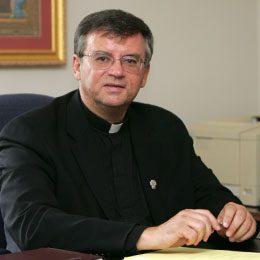 Considering Consecrated Life: Patrick Griffin, CM reflects on St. John the Baptist, Vincent and Consecration
Considering Consecrated Life: Patrick Griffin, CM reflects on St. John the Baptist, Vincent and Consecration
The Advent/Christmas Season holds up numerous individuals who can be placed in the category of “consecrated persons.” Some of them are easy to identify; others require a little more thought. For example, have you considered Simeon and Anna as “consecrated persons?”
Take Simeon:
Now there was a man in Jerusalem whose name was Simeon. This man was righteous and devout, awaiting the consolation of Israel, and the holy Spirit was upon him. It had been revealed to him by the holy Spirit that he should not see death before he had seen the Messiah of the Lord. (Lk 2:25-26)
And so, Simeon, devoted himself to awaiting the coming of the Lord. His life was dedicated to this purpose as a righteous, devout and spirit-filled individual. When he finally holds Jesus in his arms, he can pray the Nunc dimittis. He has been faithful to his calling to the end.
Anna soon follows Simeon on stage:
There was also a prophetess, Anna, the daughter of Phanuel, of the tribe of Asher. She was advanced in years, having lived seven years with her husband after her marriage, and then as a widow until she was eighty-four. She never left the temple, but worshiped night and day with fasting and prayer. (Lk 2:36-37)
Like Simeon, she has consecrated her entire life to the Lord and her calling. She offers a model of perseverance expressed through fidelity, discipline, and prayer from comparative youth to a great age. We can learn from her as from so many of our senior sisters and brothers.
These holy people prepare us for the emergence of the one who has consecrated himself to the Lord and awaits his coming in a particular way: John the Baptist.
John, from his first “appearance” in the womb of his mother until his beheading at the hands of Herod, consistently focuses our attention on the one greater than he and on the message which he brings. Nothing about John is speculative. He is grounded, in the literal sense of the word, as he dwells in the wilderness, dresses in clothes of camel’s hair, and dines on locusts and wild honey. He lives “off the land” with unmistakable simplicity. His message is one of repentance and preparedness for the coming of the Lord. When people ask him how they should change their lives, his response is firmly focused on the doable: persons who have an abundance should share with those who are needy, tax-collectors should be honest in their dealings, soldiers should treat people justly. Theory was not John’s message; he embraced the practical. When he becomes aware of the political realities of his time, he does not look the other way, but speaks boldly and fearlessly. He does not seek the agreeable or acceptable. This resolve costs him his life. It is the description of a prophet.
Many of us have read Pope Francis’ Letter on the opening of the Year for Consecrated Life (21Nov14). Among the many important instructions which he offers is the need to take up (again) the role of prophet. He reminds us that “a religious must never abandon prophecy.” He speaks about the character of the prophetic ministry:
Prophets receive from God the ability to scrutinize the times in which they live and to interpret events: they are like sentinels who keep watch in the night and sense the coming of the dawn (cf. Is 21:11-12). Prophets know God and they know the men and women who are their brothers and sisters. They are able to discern and denounce the evil of sin and injustice. Because they are free, they are beholden to no one but God, and they have no interest other than God. Prophets tend to be on the side of the poor and the powerless, for they know that God himself is on their side.
Wow. This really sounds like John and, with God’s grace, should sound like us.
John is sometimes described as the last of the Old Testament prophets and the first of the New. In all his words and actions, he keeps his eyes firmly focused on that which is most important. He recognizes Christ at his coming and his unworthiness to baptize him, yet he obeys when called to do so. He points out Jesus to some of his disciples who then leave the prophet and follow after the Lord. John knows that to which his life has been consecrated and never compromises that resolution.
The University at which I work in NY with confreres and Daughters of Charity (as well as members of the St. Vincent de Paul Society, the Ladies of Charity, and other groups) was named after John the Baptist. That dedication makes sense to me. After all, the role of a Catholic University is to point to Christ in various ways. Interestingly, the statue of St. John the Baptist which is on the campus of St. John’s reminds me of the statue of St. Vincent in St. Peter’s (Rome)—the dramatic hand gesture, the movement forward, the readiness to speak, even the sash. There are more similarities in the hearts of John and Vincent than there are differences. Both seek to bring others closer to the Lord and to proclaim the message of the Messiah without compromise. Both are consecrated to God for this purpose.
This post first appeared on http://www.cmeast.org/2014/12/14/john-baptist-vincent-consecration/
Tags: Consecrated Life, Griffin, John the Baptist, Vincent, Year of Consecrated Life

